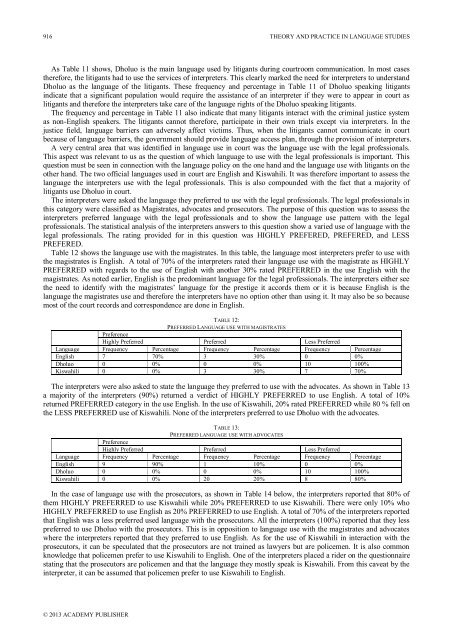Theory and Practice in Language Studies Contents - Academy ...
Theory and Practice in Language Studies Contents - Academy ...
Theory and Practice in Language Studies Contents - Academy ...
Create successful ePaper yourself
Turn your PDF publications into a flip-book with our unique Google optimized e-Paper software.
916 THEORY AND PRACTICE IN LANGUAGE STUDIESAs Table 11 shows, Dholuo is the ma<strong>in</strong> language used by litigants dur<strong>in</strong>g courtroom communication. In most casestherefore, the litigants had to use the services of <strong>in</strong>terpreters. This clearly marked the need for <strong>in</strong>terpreters to underst<strong>and</strong>Dholuo as the language of the litigants. These frequency <strong>and</strong> percentage <strong>in</strong> Table 11 of Dholuo speak<strong>in</strong>g litigants<strong>in</strong>dicate that a significant population would require the assistance of an <strong>in</strong>terpreter if they were to appear <strong>in</strong> court aslitigants <strong>and</strong> therefore the <strong>in</strong>terpreters take care of the language rights of the Dholuo speak<strong>in</strong>g litigants.The frequency <strong>and</strong> percentage <strong>in</strong> Table 11 also <strong>in</strong>dicate that many litigants <strong>in</strong>teract with the crim<strong>in</strong>al justice systemas non-English speakers. The litigants cannot therefore, participate <strong>in</strong> their own trials except via <strong>in</strong>terpreters. In thejustice field, language barriers can adversely affect victims. Thus, when the litigants cannot communicate <strong>in</strong> courtbecause of language barriers, the government should provide language access plan, through the provision of <strong>in</strong>terpreters.A very central area that was identified <strong>in</strong> language use <strong>in</strong> court was the language use with the legal professionals.This aspect was relevant to us as the question of which language to use with the legal professionals is important. Thisquestion must be seen <strong>in</strong> connection with the language policy on the one h<strong>and</strong> <strong>and</strong> the language use with litigants on theother h<strong>and</strong>. The two official languages used <strong>in</strong> court are English <strong>and</strong> Kiswahili. It was therefore important to assess thelanguage the <strong>in</strong>terpreters use with the legal professionals. This is also compounded with the fact that a majority oflitigants use Dholuo <strong>in</strong> court.The <strong>in</strong>terpreters were asked the language they preferred to use with the legal professionals. The legal professionals <strong>in</strong>this category were classified as Magistrates, advocates <strong>and</strong> prosecutors. The purpose of this question was to assess the<strong>in</strong>terpreters preferred language with the legal professionals <strong>and</strong> to show the language use pattern with the legalprofessionals. The statistical analysis of the <strong>in</strong>terpreters answers to this question show a varied use of language with thelegal professionals. The rat<strong>in</strong>g provided for <strong>in</strong> this question was HIGHLY PREFERED, PREFERED, <strong>and</strong> LESSPREFERED.Table 12 shows the language use with the magistrates. In this table, the language most <strong>in</strong>terpreters prefer to use withthe magistrates is English. A total of 70% of the <strong>in</strong>terpreters rated their language use with the magistrate as HIGHLYPREFERRED with regards to the use of English with another 30% rated PREFERRED <strong>in</strong> the use English with themagistrates. As noted earlier, English is the predom<strong>in</strong>ant language for the legal professionals. The <strong>in</strong>terpreters either seethe need to identify with the magistrates’ language for the prestige it accords them or it is because English is thelanguage the magistrates use <strong>and</strong> therefore the <strong>in</strong>terpreters have no option other than us<strong>in</strong>g it. It may also be so becausemost of the court records <strong>and</strong> correspondence are done <strong>in</strong> English.TABLE 12:PREFERRED LANGUAGE USE WITH MAGISTRATESPreferenceHighly Preferred Preferred Less Preferred<strong>Language</strong> Frequency Percentage Frequency Percentage Frequency PercentageEnglish 7 70% 3 30% 0 0%Dholuo 0 0% 0 0% 10 100%Kiswahili 0 0% 3 30% 7 70%The <strong>in</strong>terpreters were also asked to state the language they preferred to use with the advocates. As shown <strong>in</strong> Table 13a majority of the <strong>in</strong>terpreters (90%) returned a verdict of HIGHLY PREFERRED to use English. A total of 10%returned PREFERRED category <strong>in</strong> the use English. In the use of Kiswahili, 20% rated PREFERRED while 80 % fell onthe LESS PREFERRED use of Kiswahili. None of the <strong>in</strong>terpreters preferred to use Dholuo with the advocates.TABLE 13:PREFERRED LANGUAGE USE WITH ADVOCATESPreferenceHighly Preferred Preferred Less Preferred<strong>Language</strong> Frequency Percentage Frequency Percentage Frequency PercentageEnglish 9 90% 1 10% 0 0%Dholuo 0 0% 0 0% 10 100%Kiswahili 0 0% 20 20% 8 80%In the case of language use with the prosecutors, as shown <strong>in</strong> Table 14 below, the <strong>in</strong>terpreters reported that 80% ofthem HIGHLY PREFERRED to use Kiswahili while 20% PREFERRED to use Kiswahili. There were only 10% whoHIGHLY PREFERRED to use English as 20% PREFERRED to use English. A total of 70% of the <strong>in</strong>terpreters reportedthat English was a less preferred used language with the prosecutors. All the <strong>in</strong>terpreters (100%) reported that they lesspreferred to use Dholuo with the prosecutors. This is <strong>in</strong> opposition to language use with the magistrates <strong>and</strong> advocateswhere the <strong>in</strong>terpreters reported that they preferred to use English. As for the use of Kiswahili <strong>in</strong> <strong>in</strong>teraction with theprosecutors, it can be speculated that the prosecutors are not tra<strong>in</strong>ed as lawyers but are policemen. It is also commonknowledge that policemen prefer to use Kiswahili to English. One of the <strong>in</strong>terpreters placed a rider on the questionnairestat<strong>in</strong>g that the prosecutors are policemen <strong>and</strong> that the language they mostly speak is Kiswahili. From this caveat by the<strong>in</strong>terpreter, it can be assumed that policemen prefer to use Kiswahili to English.© 2013 ACADEMY PUBLISHER
















